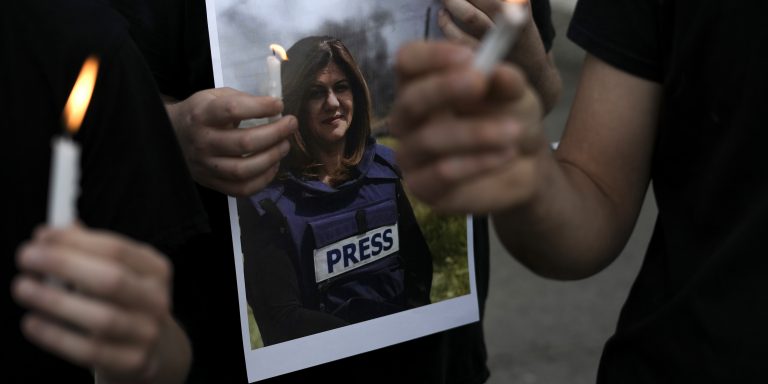INTELBRIEF
July 15, 2022
IntelBrief: The Killing of Shireen Abu Akleh and the Dangers Posed to Journalists

Bottom Line Up Front
- The May 11 killing of Palestinian-American al Jazeera journalist Shireen Abu Akleh in the West Bank town of Jenin is yet another example of the dangers journalists face while reporting in and around conflict zones.
- Saudi Arabia continues to arrest and imprison journalists, particularly those that dare to write about political and religious issues that are considered controversial.
- According to the Committee to Protect Journalists (CPJ), 293 journalists were imprisoned in 2021 and so far this year, 42 journalists and media workers have been killed.
- By intimidating, harassing, and killing journalists, security forces and nonstate actors are intentionally creating an austere information environment, facilitating serious crimes, human rights violations, and a general sense of impunity.
The May 11 killing of Palestinian American al Jazeera journalist Shireen Abu Akleh in the West Bank town of Jenin is yet another example of the dangers journalists face while reporting in and around conflict zones. Open-source investigations conducted by numerous media outlets, including The Washington Post, concluded that Abu Akleh was indeed killed by bullets fired by Israel security forces, in contrast to Israeli claims. And with U.S. President Joe Biden visiting the Middle East this week, including stops in Israel and the West Bank, there has been a hyper-focus on what, if anything, the U.S. President will say about the death of Abu Akleh. Her family recently penned a letter to President Biden, noting: “Your administration’s actions can only be seen as an attempt to erase the extrajudicial killing of Shireen and further entrench the systemic impunity by Israeli forces and officials for unlawfully killing Palestinians.” In response, Secretary of State Antony Blinken invited Abu Akleh’s family to the United States to sit down and meet with members of the Biden administration.
It was the killing of another reporter, U.S.-permanent resident, and Saudi critic Jamal Khashoggi, who was murdered in October 2018 by individuals closely linked to Saudi Crown Prince Mohammed bin Salman (MBS), that placed Biden on a collision course with the Kingdom. The U.S. Central Intelligence Agency has assessed, with medium to high confidence, that MBS personally ordered Khashoggi’s murder, an assessment shared by a United Nations’ independent investigation. Citing Khashoggi’s murder President Biden stated that his administration considered Saudi Arabia a “pariah” and would take steps to distance itself from the Kingdom. Yet, Saudi Arabia continues to arrest and imprison journalists, particularly those that dare to write about political and religious issues that are considered sensitive by the Saudi government. In several instances, dissident activists like Loujain al-Hathloul, who had campaigned for women to drive in Saudi Arabia, were imprisoned under counter-terrorism laws; although released on probation, she remains subject to a five-year travel ban. In some cases, journalists have been arbitrarily detained in Saudi Arabia, while also being denied access to legal representation. According to the World Press Freedom Index, Saudi Arabia is among the most repressive media environments in the world, along with Bahrain, Egypt, China, Turkmenistan, Iran, Eritrea, Syria, and North Korea. The Syrian regime is still believed to be holding journalist Austin Tice hostage—he disappeared in Darayya, Syria on August 14, 2012 and has been missing for close to a decade. The fate of John Cantlie, a British journalist taken hostage by ISIS nearly a decade ago, remains unclear to this day, highlighting the dangers to the media posed not only by states but also nonstate actors.
According to the Committee to Protect Journalists (CPJ), 293 journalists were imprisoned in 2021 and so far this year, 42 journalists and media workers have been killed. In June, British journalist Dom Phillips and indigenous expert Bruno Pereira were killed in the Amazon while conducting research on conservation efforts in the region. Several journalists covering the war in Ukraine have been killed by Russian shelling. A June report by Reporters Without Borders (Reporters Sans Frontiers, RSF) found evidence that a Ukrainian photojournalist, Maksym Levin, was “executed in cold blood by Russian forces, probably after being interrogated and tortured.” The RSF report relied on photos, testimonies, and physical evidence collected from the site where the incident occurred.
When journalists and media workers are not afforded the protection needed to report on war and conflict, it becomes much more difficult to access critical information and the diversity of perspectives required for informed policymaking and accountability efforts. By intimidating, harassing, and killing journalists, states’ security forces and nonstate actors are intentionally creating an austere information environment, which facilitates serious crimes and human rights violations, and a general sense of impunity. The longer-term impact of creating echo chambers that propagate and reinforce singular perspectives has been widely recognized as contributing to political polarization and intolerance across the globe. Objective journalism has never been more important, particularly in an era of disinformation, deep fakes, and hardcore censorship by autocrats and other governments seeking to dominate the narrative in their respective countries.